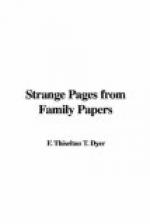While Lady Stair insisted on her right to break the engagement, Lord Rutherford in vain entreated Janet Dalrymple to declare her feelings; but she remained “mute, pale, and motionless as a statue,” and it was only at her mother’s command, sternly uttered, she summoned strength enough to restore the broken piece of gold—the emblem of her troth. At this unexpected act Lord Rutherford burst into a tremendous passion, took leave of Lady Stair with maledictions, and, as he left the room, gave one angry glance at Janet Dalrymple, remarking, “For you, madam, you will be a world’s wonder”—a phrase denoting some remarkable degree of calamity.
In due time, the marriage between Janet Dalrymple and David Dunbar of Baldoon, took place, the bride showing no repugnance, but being absolutely impassive in everything Lady Stair commanded or advised, always maintaining the same sad, silent, and resigned look.
The bridal feast was followed by dancing, and the bride and bridegroom retired as usual, when suddenly the most wild and piercing cries were heard from the nuptial chamber, which at length became so hideous that a general rush was made to learn the cause. On opening the door a ghastly scene presented itself, for the bridegroom was discovered lying on the floor, dreadfully wounded, and streaming with blood. The bride was seen sitting in the corner of the large chimney, dabbled in gore—grinning—in short, absolutely insane, and the only words she uttered were; “Take up your bonny bridegroom.” She survived this tragic event little over a fortnight, having been married on the 24th August, and dying on the 12th September.
The unfortunate bridegroom recovered from his wounds, but, strange to say, he never permitted anyone to ask him respecting the manner in which he had received them; but he did not long survive this dreadful catastrophe, meeting with a fatal injury by a fall from a horse as he was one day riding between Leith and Holyrood House. As might be expected, various reports went abroad respecting this mysterious affair, most of them being inaccurate.[13] But the story has gained a lasting notoriety from Sir Walter Scott having founded his “Bride of Lammermoor” upon it; who, in his introductory notes to that novel, has given some curious facts concerning this tragic occurrence, quoting an elegy of Andrew Symson, which takes the form of a dialogue between a passenger and a domestic servant. The first recollecting that he had passed Lord Stair’s house lately, and seen all around enlivened by mirth and festivity, is desirous of knowing what has changed so gay a scene into mourning, whereupon the servant replies:—
“Sir,
’tis truth you’ve told,
We did enjoy great mirth;
but now, ah me!
Our joyful song’s turned
to an elegie.
A virtuous lady, not long
since a bride,
Was to a hopeful plant by
marriage tied,
And brought home hither.
We did all rejoice




